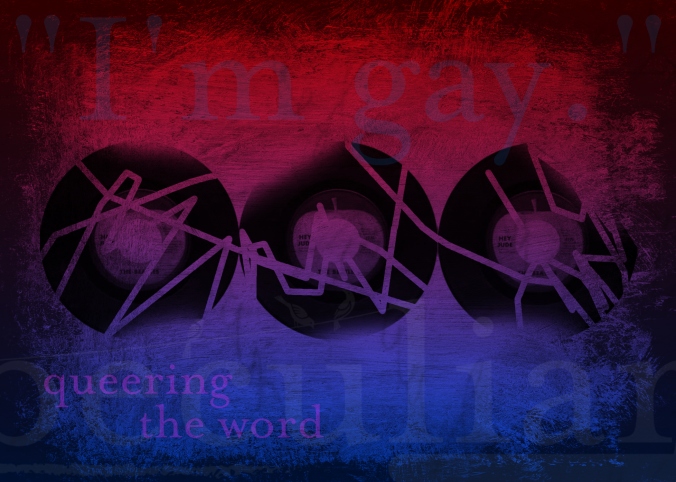I mean that I struggled with the name. If it’s an identity, a category, a label, a word, in the end it’s also a name. Long have I struggled. This “out” moment came in the culmination of many crossings intersecting with others. Among them, the Orlando shootings I’d hardly time to mourn (when that came, it was in a peculiar dream) because they fell on the weekend of my mourning for a close friend, four years dead. That’s another story and will be told some other time, yet it’s relevant—it’s the story of a friendship. For my little life orbits within and around the fiery contact of a few friendships with other guys, always “straight,” connections with clout appearing on levels both cosmic and minimal, totally prevalent, and inescapable. And maybe it’s true that the history of friendship is the last unfinished chapter of same-sex dynamics, the story still being written.
p
The horrible thing for me about what happened in Orlando is it forced me to see the banality of my own or any Gay Agenda. Some people I know have stated, elated, “We have won, after gay marriage we’ve finally made it, we have victory, we’ve been accepted…” To have such death, such loss, on such a scale, to happen after the victory is over. Can this happen to anybody. I think we can ask more questions about ourselves, like what else is possible. What more can it mean to be peculiar in the average ordinary everydayness of our lives, all lives?
p
The banality was emphasized for me shortly before this “out” moment. While riding bikes with a friend, he recounted a party he’d been to the night before. He’s a smart fish, and he hangs a hammer-and-sickle flag on his wall, and he was out of his usual depths at this party. The air felt tense like when a bad racist joke is just waiting to happen. At one point someone took out a Beatles record to play, and this immediately drew a routine series of vetoes and boos. “Dude turns around,” said my friend, “clearly sorta panicked, and goes, ‘Why, were they fags?'”
p
Suddenly I started laughing. So long and hard my friend had to stop telling his story, and half in surprise half in discomfort ask why I, his Gay Black friend, would find this funny. It took some explaining for me to realize this person was not joking, was in fact alarmed he might be promoting homosexuality by playing a Beatles record. This ignorance is comedy on one level but I found it hilarious because of something else. I fall on a certain side of the like/dislike Beatles debate, but I think people hate the Beatles precisely because they were fags: posh and well-dressed, self-obsessed, maybe confusingly popular. I don’t know if I don’t see a problem with that.
p
Gayness, I’ve maintained, is a sensibility; perhaps it can be called a lifestyle, but it’s Life style. It’s feeling. I’m talking about sushi bars, or whipped cream on your cupcake. Firework shows, baby foxes. The salty smell at the beach. The particular shade of red on stage curtains. Wearing new shoes for the first time. The voice of Chuck Jackson on “Any Day Now,” Amy Winehouse’s mascara, or Daniel Craig’s mouth slightly pursing as he calls himself Bond, James Bond. Anything grand—or desperately trying to be, anything wide-eyed with being alive, is where being gay comes from (in me). It’s an excess that’s somehow not unnecessary, or redundant. To be gay is to feel high and huge on the tender details adorning life. Usually yours.
p
Not everyone would define their gayness in this way. I’m no expert, words are free-roaming critters anyway. I won’t pretend we should take back “the old way of meaning gay as being happy.” But it’s an idea. We live in uncertain times (like the last times), and perhaps the most revolutionary thing is feeling gay, loving life itself in all its wonderful weird beauty. Having happiness and hope, though that doesn’t mean we don’t think critically at the same time. We’re in a moment when it’s more important than ever that we re-visit and re-value our values. And when words have value, they have currency, evoking responses and connections with others when used. If we choose.
p
I’d never been faced with a choice like that before, until that night at work. This suicidal teenager teetering on the edge of becoming another statistic, and me just thinking maybe reciprocity is more important than sticking to my old resistance, like I once needed to know there were others like me. For that moment, it was a word for a feeling of faith, or connection, or both. I brought myself to say it quickly, then it was over. “I’m gay.” And he looked up.
p
Matthew A. Jonassaint has worked with at-risk youth in Provo for just over two years. He’s been published in peculiar, as well as with the Rock Canyon poets and Pillars of Salt. His favorite summer read has been Bulgakov’s The Master and Margarita, his favorite record Time Fades Away by Neil Young. This fall, he’ll live in Spain doing a high school teaching gig, and you’ll probably be able to read about it soon somewhere.


Reblogged this on Trish Hopkinson and commented:
Loving this essay out in the new issue of Peculiar, Utah’s only queer lit mag. This one is by friend and local poet Matthew Jonassaint. Enjoy!
LikeLiked by 1 person
How interesting to read about the intermingling of friendship, words, life events, music. This Beatles fan enjoyed reading about the complexity of a 3-letter word in life.
LikeLiked by 1 person
I’m been looking to touch base with Matthew for FOREVER! I want to talk to him! Please connect the two of us!
LikeLike